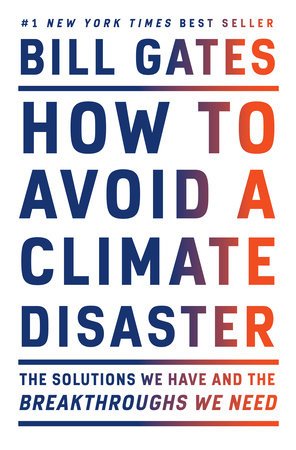Bill Gates’ New Book Has Some Worthy Advice

Bill Gates has published an important book on an urgent topic, How to Avoid Climate Disaster. It’s mostly about energy, as it needs to be, so I want to discuss it.
The book deserves a serious look, not because of who wrote it but because of what’s in it. And, I would add, what’s not. Mr. Gates is a smart man with important friends, a great deal of money, and a furious ambition to make the world a better place. He has spent a lot of time talking to other smart people and learning about energy, and no small currency investing in projects successful and non. He is worth listening to.
The book’s style is simple, direct, even a bit algorithmic. It embodies an intent to reach people of all educational levels, from high school to grad school. It succeeds well, given the span of subject matter it touches on, varying from toothbrushes to jet aircraft. Here’s an example of the Gates’ authorial voice: “It’s no accident that fossil fuels are so cheap. They’re abundant and easy to move. We’ve created big global industries devoted to drilling for them, processing and moving them, and developing innovations that keep their prices low.”
He is teaching, not preaching, conversing, not lecturing. Another example is his terminology: to reach net zero by 2050, we need to improve “how we plug in, how we make things, how we grow things, how we get around, how we keep cool and stay warm.” It’s an effective distillation.
Gates begins and ends by staking a claim for truth: the energy transition will be difficult and long. While net zero emissions are quite possible by 2050, the shift to non-carbon sources will not be close to complete. Though many trained and talented people are at work advancing the future, none of them are sorcerers (or their apprentices). Gates emphasizes the immense scale of what must be done: since 1990, nearly 3 billion new consumers of modern energy have been added worldwide, equal to all of humanity in 1960, yet there are still over a billion who do not have such access. Those who demand massive changes for the world in a single decade today are just as likely to hinder progress as help it. Realism is needed; angst or panic-driven policies tend to underestimate fact.

Gates proves this himself, repeatedly. He talks of the need to update policies regarding fuel mileage standards and how the election cycle in the U.S. creates uncertainty about technology investment and climate-related action. He also speaks for generations of scientists (incl. yours truly) in stressing, for instance, how government supported R&D is urgently needed. Since his book came out, President Biden has made epochal moves to reverse 40 years of squander in this domain, when energy R&D withered under conservative ideas demanding all such work be left to the private sector. Then there are the minor political points about OPEC and oil, China and rare earth metals, Russia and natural gas supply to Europe.
Where Mr. Bill is Dead Right
This being said, Mr. Bill gets a great deal right about energy reality. He knows electricity will be a much larger part of the future than it has been in the past. This means it will expand into transport, heating/cooling, and, eventually, some parts of industry and manufacturing.
I commend Gates for a specific point in this regard (a political one, in fact). The tendency to erect a green wall separating renewables from nuclear power is damaging to serious progress. Treating them as death enemies makes no scientific or climate sense. Both, together with other non-carbon technologies, are urgently needed. Mr. Bill provides some standard (but necessary) comments about the massive amounts of electricity reliably produced by nuclear, its small environmental footprint, and its new era of advance today. He has walked the talk, moreover, by investing in a company of his own, TerraPower, which is pursuing a unique reactor design able to use what is normally considered “waste” as an added source of fuel.
Some more truths that Mr. Bill brings forward can be listed for brevity:
- Advanced, wealthy nations have the historical responsibility to innovate and bring new non-carbon technologies to market. They are the ones with the most sophisticated science and technology, thus the sources of new knowledge. This must be their role.
- Electricity is not the total answer. Not everything can be affordably electrified in industry or transport before 2050. Especially high-temperature processes (e.g. for cement-making jet aircraft, large ships and heavy land vehicles will remain challenging. Gates admits a need to rely on carbon fuels for some uses. Net zero by 2050 is the goal.
- Technology, markets, and government policy need to work together if decarbonization is to happen effectively. This will not always happen, but it can occur often enough for real gains, if government policy doesn’t radically alter with each new president.
- One reason the energy transition will take timed is that there are serious barriers, in public opposition, to major infrastructural projects. This includes transmission lines, power plants, and the like. I would add high-speed rail (California) to this list. Failures of trust and a frayed social fabric need attention too.
- We need to think about the rest of the world, not only the U.S., when we consider or talk about climate change. While Mr. Bill doesn’t spend quite enough time on the ways in which humanity is changing—urbanization, better health, longer lives, rising incomes—he does bring these realities directly into the conversation, a very good thing.
- Gates also draws attention to the fact that global emissions have been falling in advanced nations but rising in Asia, above all China and India on a total volumetric basis. It is enormously important—hugely important, the authors suggests—that these nations seriously take on the task of decarbonizing. He might have added that if they don’t, there is little in what the West does that will matter.
- The author offers some metrics on large-scale progress (or its opposite) that have helped him grasp the tasks ahead. Readers might find these useful. “How much of the 51 billion tons [total global emissions] are we talking about?” “How much power [and how much land will it need?]”, and “How much is it going to cost?” are others.
- What I most appreciate, however, is the book’s emphasis on the necessity for optimism: We can and will do this, it says. Such is all the more meaningful, given Mr. Bill’s appreciation for how rugged lies the road ahead. He might have also said: the world is rich enough and has on its surface many people with the commitment and smarts to do what has to be done. The hurdles are high, but the goal far higher.
What He Might Have Done Better
How could this book have been better? Let me answer this with an observation. Bill Gates
is a polite person who prefers to inform rather than indict. He is more apt to confess his own failings than highlight the troubles of others. As a result, when it comes to certain aspects of the global landscape, he reigns himself to a halt and chooses a brighter, kinder path.
I interpret this as Mr. Bill’s way of modelling the cooperative tone he feels is required for international climate action. Admirable as this may be, it runs the risk of foregrounding possibility at the expense of practicality and thus underestimating the challenges to both.
- While the book does consider the world in upper case, and it admits that “global cooperation is notoriously difficult,” it fails to pursue this any further and instead celebrates the Paris Agreement as a revelation that such cooperation is esp. important. But this deletes a key aspect of the historical era we are living through. Nations are moving away from, not toward, global collaboration. Autocracy is ascendant and liberal democracies in trouble. The use of communication technologies to attack, dysinform, meddle, and surveil has become a dark normal. How this will play out for climate change is far from clear. But it presents a set of challenges that cannot be denied or ignored.
- I take it as part of Mr. Bill’s aim to remain on friendly terms with readers that he adopts the common discourse of ”clean,” “dirty,” “green,” etc. when talking about energy technologies. This type of moralizing energy-speak, which treats technology as a matter of hygiene, doesn’t belong in the language of science or engineering. Saying, as Gates does, that “a dirty electron will run your lights just as well as a clean one” is both silly and technically absurd. Given all the other metrics and recommendations in this book, as well as its urge to speak simply, “carbon” and “non-carbon” would have been far better and more objective.
- A surprising and unfortunate flaw is the author’s dismissal of geothermal energy as a source with large and global potential. I must assume Gates has been talking to the wrong people. Geothermal continues to be the most under-developed and overlooked renewable source, with the least amount of R&D, therefore the least amount of knowledge among decision-makers. MIT’s Energy Initiative has done informed work on this topic, concluding (for the U.S.): “Geothermal energy… represents a large, indigenous resource that can provide base-load electric power and heat at a level [with] major impact on the U.S., while incurring minimal environmental impacts.”
- Gates accepts a simplistic idea that attributes rising emissions in developing countries to rich nations, due to their outsourcing of energy-intensive industries. Early on, these countries focused on coal over other sources. Yet few have moved away from this source in the past two decades. In 2019, China, Vietnam, Indonesia, Philippines, Malaysia, and Thailand, all increased their coal use, which can’t be blamed any longer on rich nations who import the products of these countries.
- He could have said more about nuclear and its new era. As it expands into new parts of the world, it is bringing forth sophisticated, simplified new designs for large, small modular, and even micro reactors. Because of this, and the growing nuclear fleets in China, Russia, India, South Korea, Finland, the UK, and Eastern Europe, plus strong interest in the Middle East, Central Asia, and parts of Africa, the lingering debate in the U.S. looks more than ever like a case of the nimby flu.
- There are a few errors or disagreements with respected sources. Perhaps the most important is the figure on page 134 showing light-duty vehicles responsible for 47% of transport emissions. A majority of studies put this figure closer to 59% - 60% (see this example). The reason this is a serious difference is that it means 12% more emissions can be erased by EVs. Needless to say, every % matters.
Final Word
It should be evident that I have more positive things to say about this book than criticisms to offer. There is a good deal I haven’t mentioned that reviewers will highlight, such as Mr. Gates idea of the “green premium, defined as the added cost of using a low or zero-carbon product or technology instead of a higher emissions one (e.g. an electric car instead of a petrol or diesel powered one). I personally don’t find this a helpful way to go about daily life, calculating the damage I’m doing because I can’t afford certain choices, but that’s me.
There is a view, not often openly shared, that the best thing any young person could do in the U.S. for the cause of climate change is to vote, both in national and state elections. It is an indiscreet truth that if as much as 60% of people under 30 had done this over the past 35 years, the political situation would be radically different from what it has become and action on emissions would have begun decades ago (when Al Gore, not George W. Bush, was president).
Bill Gates does say this, though not in so many words. He even encourages young people with a passion about global warming to run for office. In the end, therefore, he is fully accepting of the importance that politics has in the struggle for progress. Such is one more reason why this book is worth reading. If it does not, finally, give us the failsafe solution to the climate problem, it does much work in providing tools of awareness that will make such a solution possible.

